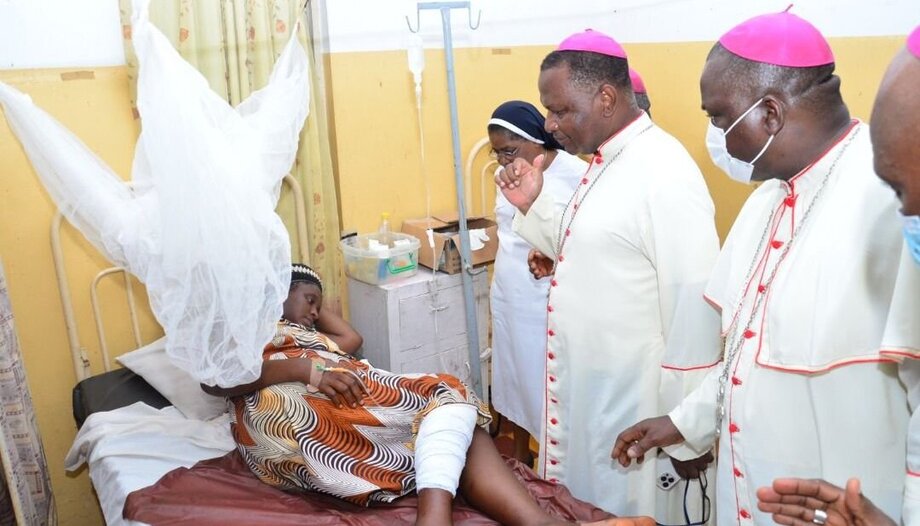 Teresa FloresLatin America has environments hostile to religious freedom".
Teresa FloresLatin America has environments hostile to religious freedom". U.S. Supreme Court issues opinion in favor of employee religious freedom
U.S. Supreme Court issues opinion in favor of employee religious freedom Religious freedom and pandemic: What can the State do and what can't it do?
Religious freedom and pandemic: What can the State do and what can't it do?According to the report on religious freedom issued by Aid to the Church in Need (ACN), which analyzes the period from January 2021 to December 2022, religious freedom has worsened in 47 countries around the world, and improved in only nine.
Aggravation at the global level
Religious freedom is a right that is violated in 61 countries (31.1 %), while in 28 countries there is religious persecution (14 %) and, in 33, discrimination (17 %). Islamist extremism affects 21 countries and 49 have an authoritarian government.
Other relevant data are that in 40 countries people have been killed or kidnapped because of their faith, and in most of them, 36 countries, the perpetrators of these crimes are rarely or never prosecuted by the judicial system. In 34 there have been attacks on or damage to places of worship or religious property.
During the period under study, there has also been an increase in persecution against Muslims, by other Muslim groups as well, as well as anti-Semitism. Nevertheless, Christianity continues to be the most persecuted religion.
However, it is noted that following the pandemic there has been record participation in popular religious celebrations and, in general, an increase in interfaith dialogue initiatives.
In Asia, China and India rank as two of the countries that most violate religious freedom: "they control access to employment, education and health services, implement massive surveillance systems, impose economic and electoral barriers, and fail to enforce law and order when religious communities are attacked by local mobs or terrorists," the report states. For example, the Chinese Communist Party uses "state-of-the-art surveillance technologies, most notably the approximately 540 million CCTV cameras distributed throughout the country (many with facial recognition capabilities), which are increasingly sophisticated."
Increase in terrorism
In addition, there has been an increase in widespread Islamist violence and a radicalization of Islam in Central Asia, as well as violent Buddhism in Myanmar (with the genocide of Rohingya Muslims, for example, in addition to the destruction by radical Buddhists of 132 churches and religious buildings since the 2021 coup d'état).
In other countries, continued attacks have led to the emigration of minorities, which may lead to their disappearance in the long term. This is the case for the Christian population of Iraq and Syria, for example, or Lebanon, where the demand for passports reached 8,000 applications per day, leading the Lebanese authorities to stop issuing them.
In Africa, there is an increase in violent extremism, with Nigeria as one of the most terrorist-prone countries in the world.
Self-censorship and accepted stereotypes
The Observatory on Intolerance and Discrimination against Christians (OIDAC) in Europe notes that in 2021 it recorded some 500 hate crimes against Christianity in 19 European countries. It also notes that there is in Europe a kind of "compulsory speech" and growing self-censorship among Christians in five areas: education, work, public sphere, social interactions and social networks. In addition, the use of negative stereotypes about Christians in the media and political groups is becoming normalized. There have also been unjustified arrests due to ambiguous "hate crime" laws.
This is also noted by ACN in its 2023 report: "Some of the cases that authorities have deemed hateful raise serious questions about whether the freedom to express religious views on sensitive moral and cultural issues is at risk. The prosecution of Finnish MP Päivi Räsänen for publicly quoting the Bible is a perfect example of this." According to OIDAC data, the right to freedom of assembly is not respected in cities in Germany, Spain and the United Kingdom alongside abortion clinics, criminalizing peaceful activities such as prayer or talking to someone. OIDAC also indicates that pressure is being exerted to withdraw conscientious objection, which would violate the right of physicians to refuse to participate in any intervention that goes against their beliefs.
At the forefront of these attacks against Christianity are France and Germany, followed by Italy, Poland, the United Kingdom and Spain.
According to OIDAC data, 76 % of 2021 hate crimes include vandalism or damage to a property, 22 % theft of sacred objects, 16 % desecration of religious objects or symbols, 10 % arson, and 10 % threats and insults.
Spanish America
"In Ibero-America (...) another form of religious violence is taking place: the identification of traditional religions as enemies of pro-abortion policies and other policies that affect women. Demonstrations are increasingly violent in Mexico, Chile, Colombia, Argentina," ACN cites in its report. For its part, the Observatory of Religious Freedom in Latin America (OLIRE), notes that in the last half of 2022, 34 people in Nicaragua were forced to leave the country because of their religion, there were 26 religiously motivated arrests, 21 kidnappings and 14 places of worship closed.
ACN indicates that, among the Hispanic American countries, only Uruguay and Ecuador have a positive outlook for religious freedom. This shows that religious freedom in Latin America has also worsened.











